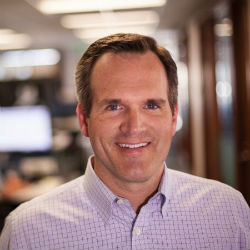
Mader confirmed that business is a software-driven era. The bold declarations that software is eating the world. “Every business is in the software business, even when software is eating the world, but AI is eating software.”
He suggests: “Software, now delivered from the cloud, drives every aspect of the modern business. From customer experience to operational efficiency to new services and products.”
Technical expertise – a barrier to business
Mader noted it was historically software developers, system administrators and those with technical expertise who were able to configure systems. They are vitally important for the business operations, but only represented 5% of the workforce. Mader suggests the remaining 95% had not been unleashed to their fullest potential. Smartsheet would like to enable 25%, 50%, or the entire company to become more productive.
“Even moving from 5% to 25% of your people building would be a huge powerful leap. People with great ideas, who are motivated, who want to contribute to do more. However, they are today left messaging, documenting or presenting on the software innovation sidelines,” says Mader.
He asserts the technical barrier in developing and evolving technology is being removed. The keys to scale and innovation are no longer in the hands of the technical few. Instead, they are available to those who are motivated to make change, who want to push the world forward.
The emergence of no code
The emergence of no code is a game-changer. The ability to achieve a software-based outcome without the need to utilise code. A simple and intuitive graphical way that allows anybody to configure systems and build applications with no code.

Considering the current pace of business. The constant change, the need for agility, the dynamic flexibility required to conduct business in a software-driven world. According to Mader: “no code is the opportunity for business to get the most from its people. To enable constant innovation from the edge.”
However, Mader noted a word of caution. Solutions built by more non-technical employees and used to run the business need to exist within an enterprise-scale platform endorsed by IT.
Mader concludes: “That quite simply is the future of business, and that is the big unlock. That’s what gives business the order of magnitude that technology promises. But this can only be made real by human ingenuity and drive.”
We have the ability to configure, customise, refine and reshape hundreds of programmes, processes and workflows to best fit the ever-changing needs of the business. It empowers users to impact the business intuitively.
Enterprise Times: What this means for business?
The nature of work has changed and adapted. As a result of the Covid-19 pandemic, businesses have found a better way to work. In addition, there’s a well-documented skills shortage across the globe. Yet at the same time, there is an increasing demand for people with specialised technical skills. As a result, no code has become a far more prominent trend and technological option for many of today’s business operations.
Smartsheet’s Engage Virtual Event was a really interesting event. The company provided examples where the no-code mindset had become a fundamental part of an enterprise broadly across the organisation. Not by a selected few, but by the whole company.
Furthermore, the event highlighted enterprises that embrace the fundamental no code capabilities as a functional company-wide practice. A process that continually advances and improves their business.
Smartsheet says it has the potential to usher in the next era of business – the no-code enterprise. No-code can become an essential ingredient in the way business work and enable employees to shape solutions to evolve, as the business matures. If the business can manage this process at scale, with security and governance, then Mader will be right. This could well be the future of business and that is the big unlock.


























